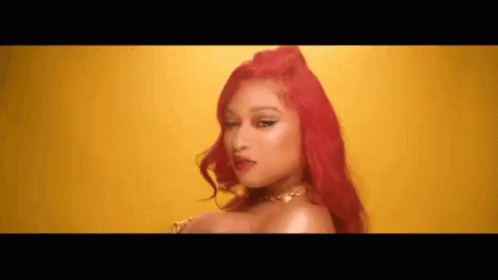the most radical thing a blk girl can do is center and insist on her right to selfhood.
This semester, I hosted a two-part series at my job which illuminated the work of up-and coming/new femmes in Music. Femme artists like Meg Thee Stallion and Summer Walker came up among others during the discussion, and a major theme that we, as a group of Womxn, kept returning to was the way in which these women center themselves and their desires within their music and the impact it has on us as womxn-identifying listeners. Interestingly enough, when we discussed negative responses to these women it largely came from Black Men whose issues stemmed from their centering of their desires and thus exclusion of the desires of Black men. To Black men like Joe Budden as we see in a portion of this interview, Meg Thee Stallion through lyrics like
“Lick, lick, lick, lick, lick. This is not about your dick/ These are simply just instructions on how you should treat my clit” (Pimpin)
“Handle me? (Huh) Who gon’ handle me? (Who?)/ Thinkin’ he’s a player, he’s a member on the team/He put in all that work, he wanna be the MVP (boy, bye)/I told him ain’t no taming me” (Hot Girl Summer)
“Yeah, I’m in my bag, but I’m in his too, And that’s why every time you see me, I got some new shoes” (Cash Shit)

she is dedicated to “degrading and demoralizing men” within much of her music and thus is the recipient of widespread “Man-hate”. Meg gracefully explains, that “Women need to feel empowered. We need to feel in charge. We need to feel confident and beautiful and strong. So when I’m making my music, I’m making shit that makes me feel good.”
As similar thread of centering female, particularly Black Female Desire and experience shows up in the work of Summer Walker, most notably in her smash-hit “Girls Need Love”, where in the bridge and chorus she states,
“I just need some dick
I just need some love
Tired of fucking with these lame N***** baby
I just need a thug…
Girls can’t never say they want it
Girls can’t never say how
Girls can’t never say they need it
Girls can’t never say now.”
In reading Wallace’s The Black Macho & The Myth of the Superwoman alongside Frank’s text, I realized some of the larger systematic issues at play regarding this cultural phenomenon of Black Men feeling threatened by Black Women’s choice in centering their self hood and desires over theirs. Wallace analyzes the Civil Rights Movement and defines it as a movement predicated on the “pursuit of [black] manhood” (33), which was expressed in a myriad of way most notably the pursuit of white women, and the responsibilities of black women lay in their role as “the workhouse that keeps his house functioning” (14) where she is given little agency in the expressions of her own story. Frank’s text further foregrounded the anxiety ridden preoccupation that black men had with the way they were being perceived in media such as Shange’s for colored girls who have considered suicide/when the rainbow is enuf and Sapphire’s novel turned film Precious (Push). In the centering of Black Femme Experiences there is a feeling from black men that we are omitting the experiences and voices of Black Men, and this is precisely why womxn like Shange, Summer Walker, Alice Walker, Meg, among a myriad of others faced (and may continue to face) this backlash from Black Men. The White Gaze and more importantly the White Male Standard of Living that Black Men are conditioned to approximate is what fuels their vehement distaste of these acts of centering the desires and selfhoods of black women, because it calls into question the foundation of their selfhood outside of their gender and the privilege it affords them.
It is this centering of one selves that these Black Femme artists from, Shange to Summer, that make their work so radical along with so powerful for Black Women all over the world across time. What I kept going back to during my reading of this week’s texts was this question of, “What does it mean for Shange to insist—from the choosing of her name to be “she who comes with her own things”— on emphasizing her inherent right to autonomy in regard to expressions of her selfhood because of her Black Womxnhood rather than despite it?” She breaks the chain of dependence to a system not made with our selfhoods or desires in mind, and creates stories that re-imagine our visions of ourselves as the center of our worlds rather than the omitted or the periphery.
It is in her lineage among other Black Femme creators that Black femme performers like Meg and Summer can create the art that they do.


Comment ( 1 )